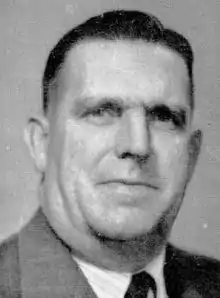Jim Eggins
Eldred James Eggins (7 April 1898 – 28 January 1952) was an Australian politician and a member of the Country Party of Australia.
Jim Eggins | |
|---|---|
 | |
| Member of the Australian Parliament for Lyne | |
| In office 10 December 1949 – 28 January 1952 | |
| Preceded by | New seat |
| Succeeded by | Philip Lucock |
| Personal details | |
| Born | Eldred James Eggins 7 April 1898 Grafton, New South Wales |
| Died | 28 January 1952 (aged 53) Darlinghurst, New South Wales, Australia |
| Nationality | Australian |
| Political party | Australian Country Party |
| Occupation | Farmer |
Jim Eggins was born at Grafton, New South Wales and educated in state schools. He served in the military in 1918 and later grew bananas in the Brunswick River region, and was a seed merchant in Lismore. He also served on Lismore City Council, including as mayor in 1932, 1935 and 1936.[1]
Eggins served as the Chairman of the New South Wales Fodder and Conservation Board. He was also Chairman of the New South Wales Country Party from 1945 till 1949.
He served in the New South Wales Legislative Council between April 1940 and October 1949.[2] He was elected as the member for the Division of Lyne in the Australian House of Representatives in 1949,[3] and was re-elected in 1951.[4]
Eggins died in office on 28 January 1952, a day after being admitted to St Vincent's Hospital, Sydney, with a "cerebral condition". He had two sons and four daughters, with one son killed in World War II.[5] His death prompted the 1952 Lyne by-election at which Philip Lucock retained the seat for the Country Party.
References
- "Death of Jim Eggins". Daily Examiner. Grafton, NSW. 30 January 1952.
- "Mr Eldred James Eggins (1898-1952)". Former members of the Parliament of New South Wales.
- "1949 legislative election: House of Representatives: New South Wales". Psephos - Adam Carr's Election Archive. Retrieved 21 June 2020.
- "1951 legislative election: House of Representatives: New South Wales". Psephos - Adam Carr's Election Archive. Retrieved 21 June 2020.
- "Sudden Death of E.J. Eggins". Daily Advertiser. Wagga Wagga, NSW. 29 January 1952.